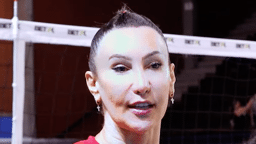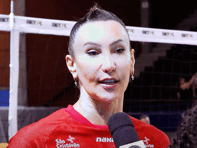Part of Outsports’ series on our 100 most important moments in gay sports history.
 Track & Field, 1986. For Spanish hurdler María José Martínez-Patiño , the journey to prove her womanhood in the world of sports was costly. In 1983 she competed in the World Track & Field Championships in Helsinki, Finland; It was there she “passed” her first gender test and received a Certificate of Femininity. Two years later at the World University Games in Kobe, Japan, she forgot her certificate and had to take a gender test again. This time, she failed the test and was not allowed to compete.
Track & Field, 1986. For Spanish hurdler María José Martínez-Patiño , the journey to prove her womanhood in the world of sports was costly. In 1983 she competed in the World Track & Field Championships in Helsinki, Finland; It was there she “passed” her first gender test and received a Certificate of Femininity. Two years later at the World University Games in Kobe, Japan, she forgot her certificate and had to take a gender test again. This time, she failed the test and was not allowed to compete.
Everyone kept the situation quiet, and in January 1986 she was told to feign injury and opt out of the Spanish national championship. She refused and won the 60m hurdles. Almost immediately her story was leaked, she was thrown off the national team, and her national records were erased from the record books. From her personal account of the weeks that followed:
Part of Outsports’ series on our 100 most important moments in gay sports history.
Track & Field, 1986. For Spanish hurdler María José Martínez-Patiño , the journey to prove her womanhood in the world of sports was costly. In 1983 she competed in the World Track & Field Championships in Helsinki, Finland; It was there she “passed” her first gender test and received a Certificate of Femininity. Two years later at the World University Games in Kobe, Japan, she forgot her certificate and had to take a gender test again. This time, she failed the test and was not allowed to compete.
Everyone kept the situation quiet, and in January 1986 she was told to feign injury and opt out of the Spanish national championship. She refused and won the 60m hurdles. Almost immediately her story was leaked, she was thrown off the national team, and her national records were erased from the record books. From her personal account of the weeks that followed:
I was expelled from our athletes’ residence, my sports scholarship was revoked, and my running times were erased from my country’s athletics records. I felt ashamed and embarrassed. I lost friends, my fiancé, hope, and energy. But I knew that I was a woman, and that my genetic difference gave me no unfair physical advantage. I could hardly pretend to be a man; I have breasts and a vagina. I never cheated. I fought my disqualification.
Two years later, the International Association of Athletics Federation, the world’s track & field governing body, gave Martínez-Patiño the green light to compete again. By then it was too late: Her time away from the sport, and the mental toll of her fight to compete, had killed her chances. She missed the 1992 Barcelona Olympics by one-tenth of a second.
Her plight brought some much-needed attention to the issue of gender testing, which helped lead to the end of mandatory tests a decade later. It was one of the last high-profile bannings based on the gender test in track & field until Caster Semenya 20 years later (per Zwischengeschlecht.org).
For more information:







































